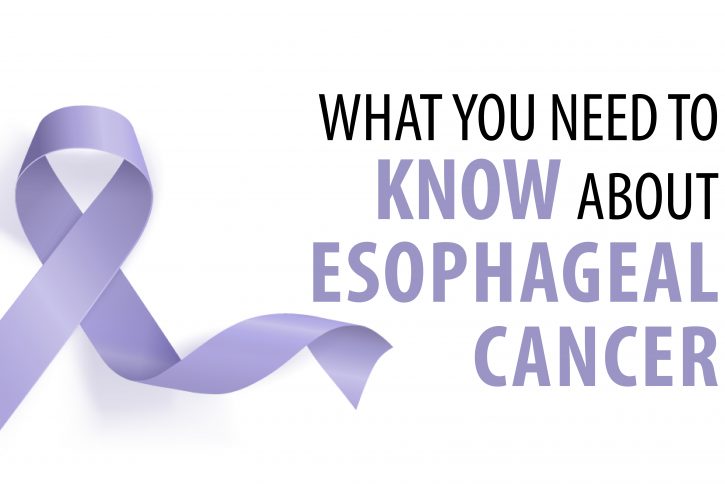
Article originally published April 14, 2021.
Esophageal cancer begins in the cells that line the esophagus – the tube that connects the mouth to the stomach. This type of cancer can be associated with long-term gastroesophageal reflux disease (GERD) symptoms and alcohol and tobacco use.
There are two main types of esophageal cancer determined by what type of cell the cancer starts in. Squamous cell carcinoma starts in the inner layer of the esophagus, and adenocarcinoma starts in the gland cells.
More than 18,000 new cases of esophageal cancer were diagnosed last year.
Esophageal cancer accounts for about 1% of cancer diagnoses in the United States, but is more common in other parts of the world.
Four out of five cases of esophageal cancer are found in men.
Men are three to four times more likely to develop the cancer than women.
The average age at diagnosis is 68.
While esophageal cancer can be diagnosed at any age, it is most common among people aged 65-74. People under the age of 55 account for less than 15% of cases.
About 20% of people with esophageal cancer survive five years or more after diagnosis.
This increase is likely due to improved screening and treatments.
Risk Factors
1 in 5 Americans have at least one leading risk factor for esophageal cancer.
- Age – Your risk of esophageal cancer increases as you get older.
- Gender – Men are more likely to develop esophageal cancer than women.
- Tobacco use – Using any kind of tobacco product greatly increases your risk of esophageal cancer.
- Alcohol use – Drinking alcohol puts you at higher risk of esophageal cancer, especially if you also use tobacco.
- Gastroesophageal reflux disease (GERD) – Prolonged GERD symptoms can increase your risk of this cancer.
- Barrett’s esophagus – Risk is much higher for those who have already experienced these cell changes in their esophagus.
- Obesity – People who maintain a healthy weight are less likely to develop esophageal cancer – partially due to the fact that gastroesophageal reflux disease is more common in those who are overweight or obese.
If you are experiencing symptoms of esophageal cancer or have a history of frequent heartburn or reflux disease, talk with your healthcare provider or contact the Fairfield Medical Heartburn Center at 740-689-6486. Even if your reflux symptoms are controlled or if you had symptoms that went away, you could still be at risk.
To learn more about esophageal cancer and FMC’s cancer care services, click here.